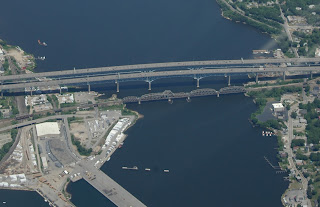Robert M. Pope is native to New London, CT, where he lives today. A seaport city, New London was originally called Nameaug by the Native American Pequot tribe who were the original inhabitants. After John Winthrop Jr. created an English settlement there in 1646, the naming of the English town became a point of contention. Residents called their town Pequot, honoring the original natives. The Connecticut General Assembly tried to name the town Faire Harbour, but English residents declared they would rather call it Nameaug. They did not prevail however, as the village was officially dubbed New London in 1658, apparently a nod to the old country capital of London, England. The importance of New London as a hub of commerce was determined by the location on the mouth of the Thames River, located at the center distance between the ports of New York City, NY (128 miles) and Boston, MA (107 miles). A busy port of entry, New London began its commercial life as a whaling port, and the riches brought into the city by the whaling industry paid for the architecture which is still extant today.
New London CT paid a price for being central to the cause of the Revolutionary War: the treachery of traitor Benedict Arnold resulted in New London nearly burning to the ground in 1781, as Arnold betrayed information regarding the navy goods stored at the harbor, and caused the defeat of Fort Trumbull and Fort Griswold, the Revolutionary defensive bastions of New London CT and its harbor. For More Information Visit at http://www.sbnation.com/users/robertmpopenewlondonct
New London CT paid a price for being central to the cause of the Revolutionary War: the treachery of traitor Benedict Arnold resulted in New London nearly burning to the ground in 1781, as Arnold betrayed information regarding the navy goods stored at the harbor, and caused the defeat of Fort Trumbull and Fort Griswold, the Revolutionary defensive bastions of New London CT and its harbor. For More Information Visit at http://www.sbnation.com/users/robertmpopenewlondonct
